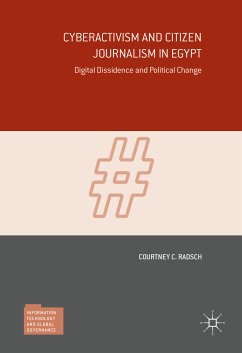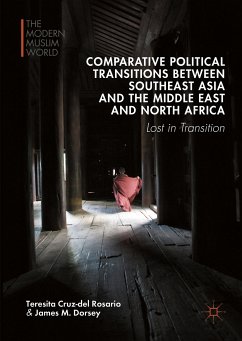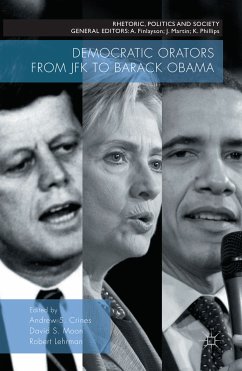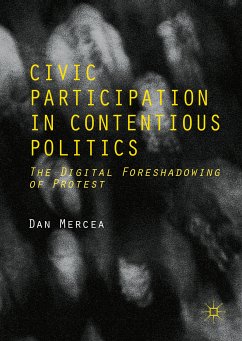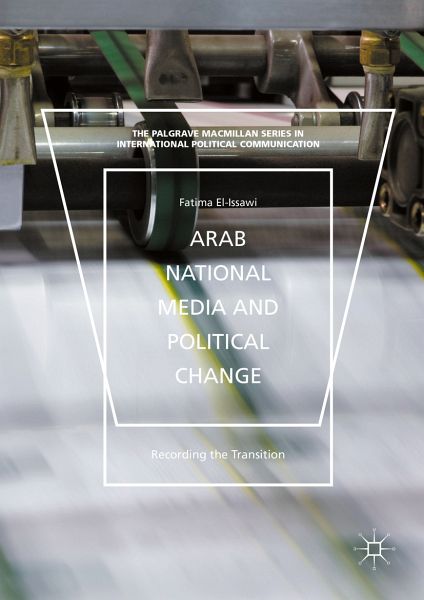
Fatima El-Issawi
eBook, PDF
Arab National Media and Political Change (eBook, PDF)
"Recording the Transition"

PAYBACK Punkte
20 °P sammeln!






Arab National Media and Political Change (eBook, PDF)
Dieser Download kann aus rechtlichen Gründen nur mit Rechnungsadresse in A, B, BG, CY, CZ, D, DK, EW, E, FIN, F, GR, HR, H, IRL, I, LT, L, LR, M, NL, PL, P, R, S, SLO, SK ausgeliefert werden.
- Geräte: PC
- ohne Kopierschutz
- eBook Hilfe
- Größe: 2.08MB
- Text-to-Speech
- E-Mail des Verlags für Barrierefreiheitsfragen: accessibilitysupport@springernature.com
- Keine Einschränkung der Vorlesefunktionen, außer bei spezifischen Ausnahmen
- Keine oder unzureichende Informationen zur Barrierefreiheit
.Fatima El-Issawi is Senior Lecturer in Journalism at the University of Essex and Assistant Professorial Research Fellow at the Middle East Centre of the London School of Economics and Political Science (LSE). She has been leading research projects on Arab media under transition in the context of the Arab Spring. She currently leads the research project "Arab National Media and Politics: Democracy Revisited" based at the Middle East Centre. Her research focuses on the media industry in the Middle East and North Africa as it intersects journalism, public communication, policy, and academia. She has over fifteen years of experience as correspondent in conflict zones in the MENA region for international media.
Produktdetails
- Verlag: Palgrave Macmillan US
- Seitenzahl: 202
- Erscheinungstermin: 8. November 2016
- Englisch
- ISBN-13: 9781349709151
- Artikelnr.: 53148761
"A useful reference tool for academics, policymakers and the media development community. The book is littered with countless specific examples of how journalism has shifted in the region over the last seven years, drawing comparisons with similar experiments in other areas such as Latin America and Eastern Europe. For this reason, it deserves to be read and referenced by media and MENA scholars as well as anyone who has an interest in the changing shape of the media and democracy." (Aida Al-Kaisy, LSE Business Review, blogs.lse.ac.uk, October, 2017)
"This book is a must-read for anyone who is interested in better understanding the complexity, hybridity, and fluidity of both the Arab Spring transitions, as well as the numerous forces and multiple influences which are both shaping, and reflecting, them continuously, such as the equally complex, hybrid, and fluid roles of Arab journalists and mainstream media actors." (Sahar Khamis, Human Rights Centre Blog,hrcessex.wordpress.com, September, 2017)
"El-Issawi's book presents a comprehensive study of the traditional media landscape in the Arab World, outlining its role in the transition that followed the Arab Spring. It brilliantly captures the structural role of media as a major (political) actor in a period of tumultuous transition." (Monica Ibrahim, Middle East Centre Blog, blogs.lse.ac.uk, March, 2017)
"This book is a must-read for anyone who is interested in better understanding the complexity, hybridity, and fluidity of both the Arab Spring transitions, as well as the numerous forces and multiple influences which are both shaping, and reflecting, them continuously, such as the equally complex, hybrid, and fluid roles of Arab journalists and mainstream media actors." (Sahar Khamis, Human Rights Centre Blog,hrcessex.wordpress.com, September, 2017)
"El-Issawi's book presents a comprehensive study of the traditional media landscape in the Arab World, outlining its role in the transition that followed the Arab Spring. It brilliantly captures the structural role of media as a major (political) actor in a period of tumultuous transition." (Monica Ibrahim, Middle East Centre Blog, blogs.lse.ac.uk, March, 2017)
Für dieses Produkt wurde noch keine Bewertung abgegeben. Wir würden uns sehr freuen, wenn du die erste Bewertung schreibst!
Eine Bewertung schreiben
Eine Bewertung schreiben
Andere Kunden interessierten sich für



